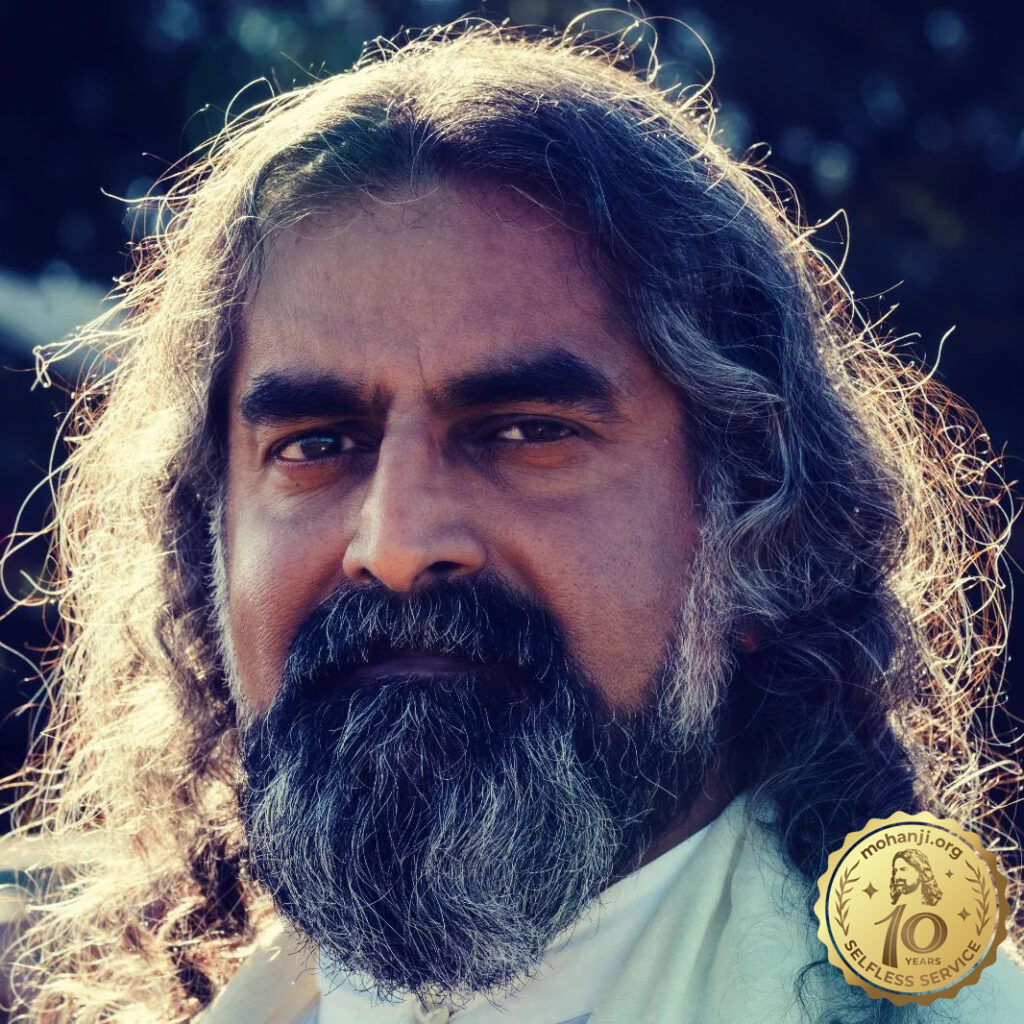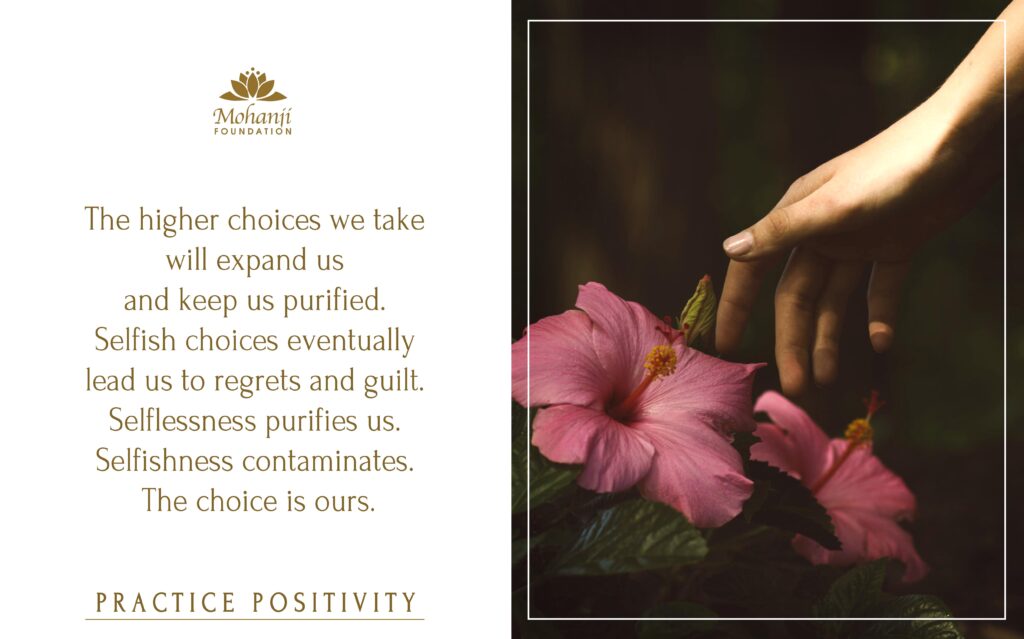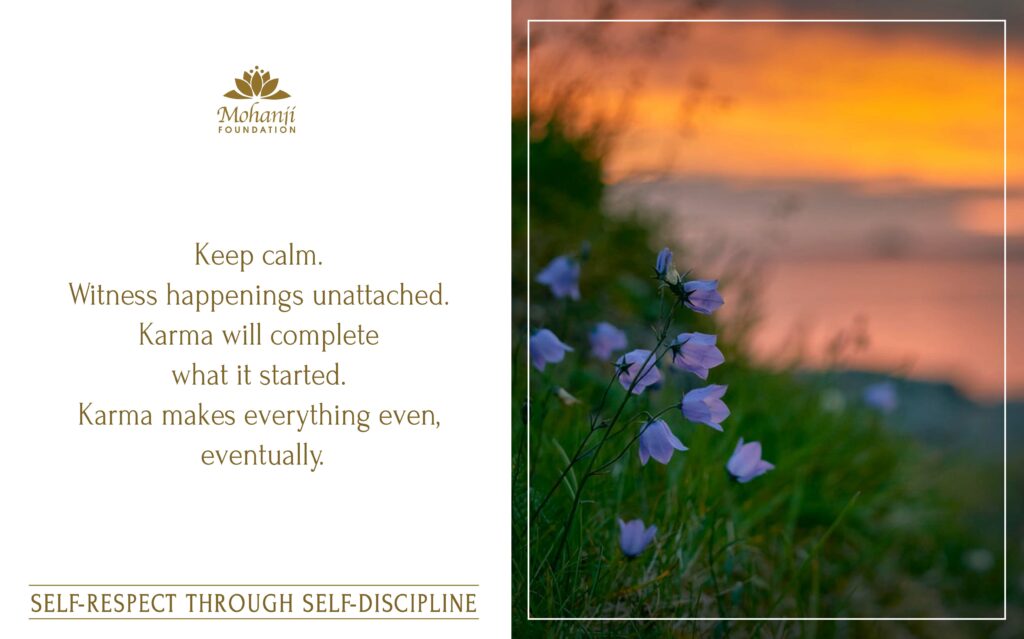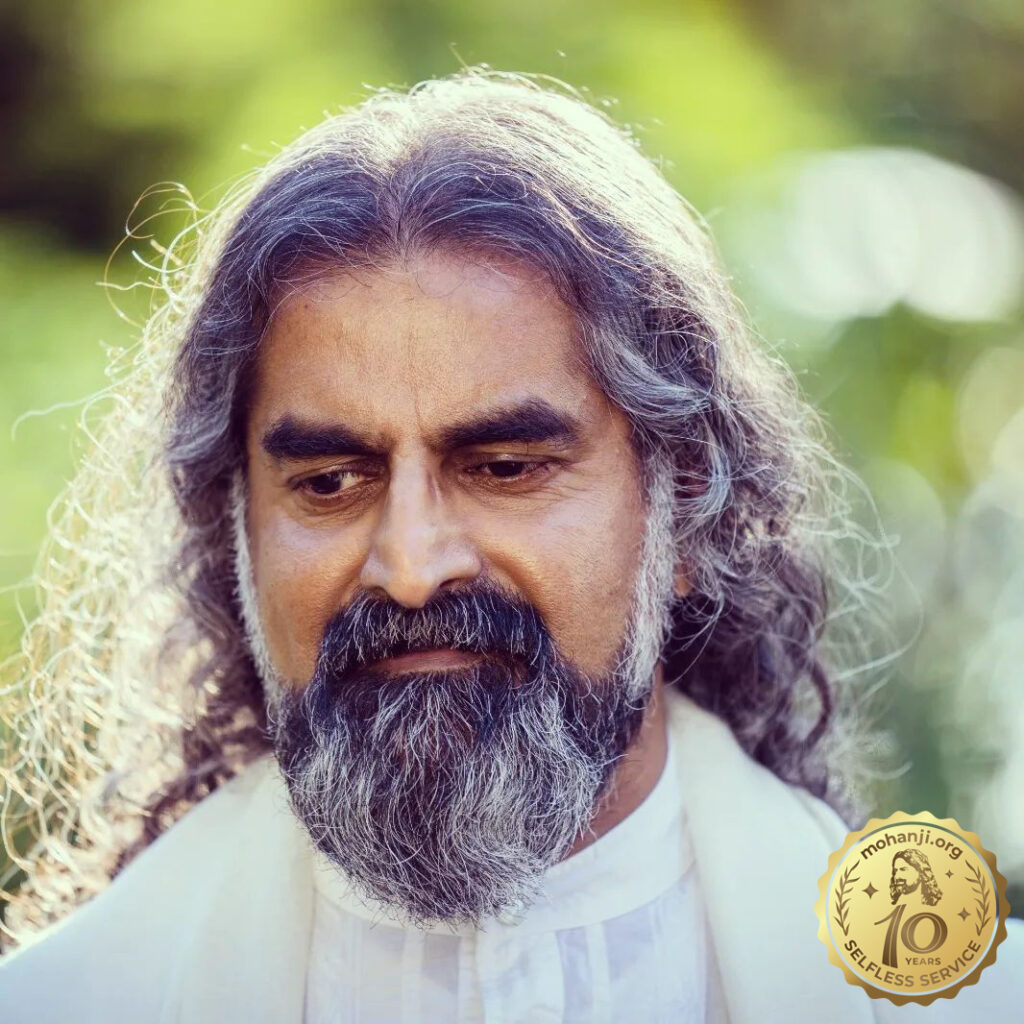Dealing with the world | Mohanji
Hello, my friends,
Hope you’re doing well. It’s been a while since we spoke here.
Here I have some questions from someone who wants to know how to manoeuvre in a society that’s filled with excesses, confusion and various types of people who are probably not so compatible with having an existence based on ahimsa and purity.
Categories of people in this world
I’ll try to address this question, and in general, we can categorize people into four states or four types. I would rather use the story of Mahabharata to express this because that’s easier for people to understand. In Mahabharata, we’ve seen four types of people; majority – it’s like broad categories. There are 1000s of types of people, but if we put them in cubes or islands, there are four different types of people; I like to segregate them in that way.
One of them is intelligent, sensitive, and good. This category of people we can see in the world is very intelligent, like Lord Krishna. Lord Krishna is a perfect example: very smart and very intelligent, but he means good to the world. All his actions are with pure purpose; his intention is pure. This is one of the categories, and they’ll have much following. They’ll never harm, hurt or disturb anyone; they’ll only take them to higher awareness or higher good. This is one category.

One of the categories of people is intelligent, sensitive and good like Lord Krishna.
– Mohanji
The other category: they are intelligent, but they are selfish. They do everything to manipulate and control people and use them for their own selfish means. You can see that in Duryodhana or Shakuni, and in today’s times, most dictators are like that. Most dictators have been like that. They use people to their advantage.
Then there’s another type of people. It’s a broad category, but they are reasonably passive and emotional. They’re not really using their intelligence much. They are emotional, very good people, very good-hearted. They mean good to people, but sometimes because they use emotions more, their effectiveness is reduced. They can be controlled by intelligent selfish guys because these dictators control the good people as well because they are emotional.
They don’t use their intelligence, and they don’t use it the right way to help the helpless. This is the third category. In Mahabharata, Yudhishthira was one of them, the eldest brother of the five Pandavas, because he was emotional. He was a good man, but he was emotional, and he got involved with all the confusion or the traps that were set for him and his brothers by the opponent team, his cousins.
He wasn’t able to save anybody, but the intelligent, wise Krishna, was able to save because he’s intelligent; he’s not emotional. The people who were trapping people were intelligent and cunning; they were manipulative and were using their intelligence for their selfish purpose.

Now the last part: they are passive, they are emotional, and they aren’t so good. Because they don’t care, they’re very insensitive. Dushasana is the primary example. He was used by his intelligent cousins, his brothers and his cousins. He would just do what they said; he wouldn’t even think whether it was right or wrong. They would say, and he would do.
There are so many people like that on Earth. Somebody, some kingpin, will command, and they’ll execute it. They’ll not even think about whether this is right or wrong or if somebody is hurt or not hurt; they don’t think at all.
These are the four major categories of people on Earth. What we need to do is to be aware that when we speak to these people, we’ll get to know what kind of orientation they have and what kind of orientation they are operating from.
Then we can easily understand whether they are intelligent and good, like Krishna, or intelligent and selfish, like Duryodhana, or passive, and kind of they’re good, but they are not effective because their effectiveness is affected by their emotions, like Yudhishthira. Also, some people are extremely insensitive. They mind their own pleasures; they are only interested in their own pleasures. They follow commands without thinking.
All people are in one of these categories or a mixture of them. As I said earlier, you can’t put anybody only in one category; we are all a mixture. The predominant operating orientation that makes the person exactly is the person. That’s how a person can be identified. We got to understand that, and as the Upanishads say, ‘You’ve been given such intelligence to know that a snake will bite, and it can have poison. So, don’t put that snake on your lap.’
Be aware, alert, and active
We must be aware, we must be alert, and we must be active. It’s useless to punish people because we have law and order in our country. Every country has a system of law. Society has all these mixtures of people, and the laws are made in such a way that the evil or the aggressive or those who create problems are punished. We are not supposed to do that.
We can probably expose it to the world. Say this is what’s happening; atrocities are happening, and there’s cheating, stealing, and robbing happening. We bring them to light, and possibly the judiciary, the police, the system, and the law and order will take care of it. That’s the best way, and essentially, karma takes care of everything. So, leave it to karma, but I don’t recommend passivity because then we haven’t understood ahimsa clearly.

We’ve been practising ahimsa, which is nonviolence, but ahimsa doesn’t mean passivity, which means we are passive; we ignore everything and allow all the atrocities to happen. That’s not right. Even Krishna has told this in Mahabharata that it’s your duty to stand against atrocities. But that doesn’t mean that you punish somebody by taking the law into your own hands.
It’s important to address it as effectively as you can. Today it’s very easy; there are media. You can talk about it. You can post videos, pictures, or all evidence on social media or to the police. If the police are not responding, definitely social media will help. This can be done.
Regarding passivity, ahimsa also means you need to stand up for the truth. Self-protection is a part of ahimsa. Ahimsa simply means you shouldn’t initiate bad energy or you shouldn’t harm people through your thoughts, through your words, expressions or actions. You shouldn’t initiate violence from your side, but if violence is happening and spilling over to you, you have to defend yourself. That’s a part of ahimsa. I hope this is very clear.
Domestic violence – how to tackle it?
The next question asked was – raging domestic violence in humans. What should we do against this? Domestic violence is increasing, as we understand, because people are operating more on the emotional plane, and also, the influx of information through social media. Violence and the things they see, the sadistic pleasures which are kind of promoted through various games and stuff, are pushing people to hurt themselves or even to die, to commit suicide, etc.
A lot is happening in the world. Social media and the games and all these things are literally affecting the brains of the youth. So, this is happening; how can we contain it? There’s only one way. One is to bring awareness to people. Then take people off these gadgets and the platforms through which this is spread to activities of social nature which is helping the helpless and taking care of the poor.

Take people off gadgets and platforms through which domestic violence is spread. Get them involved in activities of social nature such as helping the helpless.
– Mohanji
We must give recognition, rewards and awards to people who are doing extraordinary for the helpless beings of society, which includes people, animals, birds, flora, fauna, forest, and everything. Those who are helping those helpless beings have to be accepted, rewarded, appreciated and honoured. Through this, if we develop that attitude in the youth, probably there’ll be a cleaner society.
Domestic violence is a conflict between two egos; that’s what is causing it. One becomes a victim, and one becomes an oppressor. Of course, if it’s too violent, then it can’t change the oppressor’s mindset. You got to take him out and put him under the law, the eyes of the law. That is, if somebody’s really violent and society cannot handle them, the family cannot handle them, then the law has to handle them; otherwise, through awareness, rewards and awards.
If there’s some kind of benefit, people usually do things. There’s always this feeling of, “Oh, I am rewarded for doing good.” That means you end up doing it. Governments and societies can implement it and bring people to the levels. Even at the school level, you can bring people to that level of awareness, which will help them stay away from crimes.
How to address injustice?
The next question asked was, I’m a strict person; I don’t tolerate injustice.
Whether we are strict with ourselves or not, injustice has to be addressed. Today, we have social media. It’s easy for you to talk. I used to do that. When I used to see pregnant cows being slaughtered, pregnant animals, various pigs, cows, sheep – all these beings tortured and killed, I used to address them. I used to have a lot of following in that. Today’s social media is very powerful, and you can definitely talk about the vices of society and bring awareness to them.
Don’t only think about vices. Also, you should talk about the good parts, the goodness that people are actually displaying. Life is not only bad but there are also good and there are bad things happening in society. Highlight them and tell this to the people. Tell them this is happening, and we have to appreciate it and we must. The bad things – this shouldn’t happen. If it’s not happening, society will be cleaner. So, you have every way of addressing this.
I hope this was helpful. I wish all of you great health, happiness, peace and lots of love.
I’m always with you. I love you.
This is Mohanji, signing off.
Listen to this podcast here.
Mohanji Speaks channel is also available on Spotify and Apple.
Transcribed by Ulla Bernholdt
Proofread by Geetha K.S

